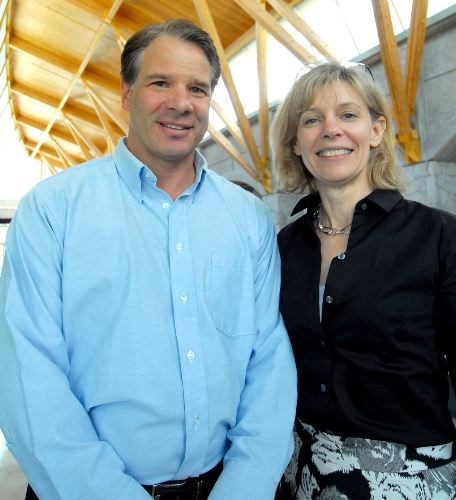A two-day cancer care symposium held at UNBC this explored finding solutions to the breakdown in communications that exists between family physicians, medical specialists and patients.
Dee Mangin, a family physician from New Zealand, shared some of the innovative clinical practices she's helped develop as an associate professor and director of the primary care research group at the Christchurch School of Medicine at the University of Otago. Her goal was to help doctors in Prince George from all fields find ways to improve the flow of patient care information.
"There are loads of diseases that require communications between specialists and primary care doctors," said Mangin. "People want to develop integrated care and they do it by [establishing different care guidelines for each] disease. So you're there at the other end as a primary care doctor trying to remember which one's which, and they all work differently. Patients don't come neatly packaged as single-disease models, many have three conditions or more, so having a model of care that will work seamlessly across all the conditions is exciting."
Because patients suffering from several diseases are prescribed different medications to treat each condition, family doctors struggle to find the right mix that will best serve their patients. There's huge potential for harmful interactions with the drugs, and sometimes patients have to prioritize which symptoms they most want to eliminate. Mangin says it's a complex task for doctors, highlighting the need for better communications.
She says it's critical that doctors not let privacy issues become a barrier to communications that will lead to better patient care. Family physicians who have difficulty tracking down lab test results and other patient information from specialists is a global problem and Mangin says that's because the computer software used is usually not compatible.
Mangin teamed up with UNBC assistant professor and family doctor Dan Horvat to lead the symposium. For several months, Horvat and gastroentologist Paul Winwood have been involved in the Northern Partners in Care research initiative to create better shared care patient services across Northern BC.
"We're trying to ensure that patients can get cared for as well as possible in their communities -- it's challenging sometimes to go back to Vancouver or even come to Prince George for treatment," said Horvat.
"The new cancer centre is going to help a lot, but there will still be a need for people to receive follow-up care in their communities. Cancer is a very scary thing for people to have, and as they go from diagnosis to treatment to the care they receive after treatment. A lot of times they feel there are gaps in the system. Communication isn't as good as it could be and they sometimes feel things aren't done as quickly as they need to be."
For doctors to make fundamental changes in the way they conduct their work in delivering patient care, the needs of patients have to be taken into account as much as possible, and Horvat says there's plenty room for improvement. He admits part of the problem is the current system often does not allow doctors adequate time to report back to their patients.
"We're not as good as we could be at understanding the patient's experience and we need to find ways to incorporate that into the activities we do, so we're constantly getting feedback on what's working and what's not working," Horvat said.
"With the cancer clinic opening up, and having to put in place new processes and new approaches, it's a good time to start thinking about doing things differently. It's much harder when people have been ingrained in certain positions and certain roles for many years. We need to find what will work best in a northern environment with geographical challenges."



